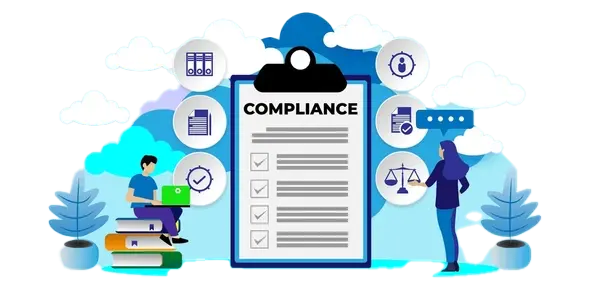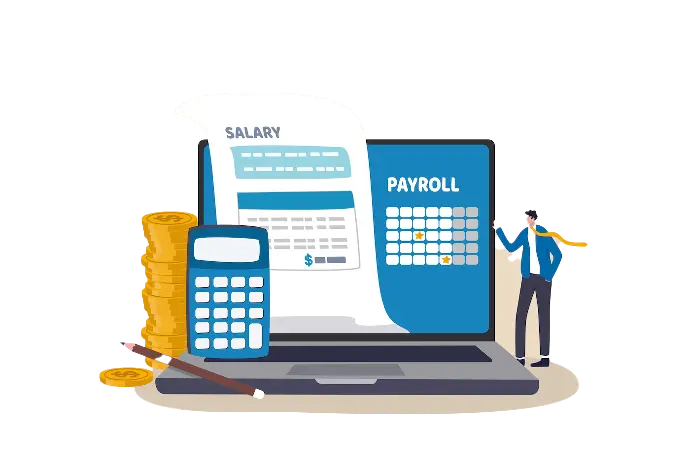What We Do Best
Vauras believes that Delightful Service and Robust Preventive Culture can save you lakhs and keep you ahead of the curve as compared to a ” jab hoga, dekha jayega ” approach of many freelancers.
Hum PF, ESIC, P-TAX kaise manage karte hai
Labour Compliance Consulting
Compliance Annual Contract enables SMEs to utilize the expertise of highly paid and in demand EPFO, ESIC and P-Tax professionals for a pocket friendly price.
Third Party Payroll
Call it Payroll Outsourcing, Offroll, Third Party Payroll, Contractual Payroll or FREEDOM from EMPLOYEE TRANSACTION & COMPLIANCE HASSLES
Payroll Process Management
Why depend on a single person’s competency when you can have a whole team of reputed experts doing it for you at a fraction of the cost.
Labour Compliance Consulting
When you are not ready for substandard compliance management, and hiring a high paid employee for compliance is not feasible; or you are stuck in a compliance mess and want to focus on your core business without being tied up by non productive work Compliance Annual Contract is the solution for you.

- Joining & Exit
- PF challan
- ESIC challan
- Inspection Assistance
- Regulatory & Statutory Updates
- Government Schemes and Subsidies
- Employee KYC assistance
- PF & ESI claim assistance
- And more…
Payroll Process Management
When you want all the advantages that come with Third Party Payroll but cannot keep employees on offroll due to business compulsions, Payroll Process Management is the perfect balance. Vauras will act as your offsite payroll team.

- Employees on YOUR Payroll
- Employee Joining Formality
- Employee KYC
- Appointment Letter
- Attendance Management
- Leave Management
- Advance Management
- Overtime & Incentives
- Bonus & Gratuity
- Group Insurance & Salary account
- Salary-Sheet and Payslip
- EPFO & ESIC
- Labour License & LWF
- PF & ESIC Claim
- And more…
Third Party Payroll
If you are looking for a simplified and agile workforce without entangling yourself into monotonous compliances, Third Party Payroll can be your best bet. This solution simplifies your entire employee compensation process into a single billing transaction.

- Employees on VAURAS’ payroll
- Employee Joining Formalities
- Employee KYC
- Appointment Letter
- Attendance Management
- Leave Management
- Advance Management
- Overtime & Incentives
- Bonus & Gratuity
- Group Insurance & Salary account
- Salary-Sheet and Payslip
- EPFO & ESIC
- Labour License & LWF
- PF & ESIC Claim
- Uniform & ID cards
- And more…
The VAURAS Advantage
Diverse Client Portfolio
Professional Systems
Compliance Expertise & Experience
Attention To Details
Excellent Customer Service
Dedicated Team
Transparent Corporate Governance
Embracing Change
Innovative Process Design
Some Basics
The Employees' State Insurance (ESI) scheme is a comprehensive social security system designed to provide medical and cash benefits to Indian workers. Managed by the Employees' State Insurance Corporation (ESIC), it covers employees earning below a certain wage limit in case of sickness, maternity, or employment injury. The scheme ensures that employees receive medical care and financial support during times of need, promoting their well-being and productivity. By understanding the benefits and eligibility criteria of the ESI scheme, workers can better navigate their rights and entitlements, ensuring a safer and more secure work environment.
A Provident Fund (PF) is a vital financial tool that helps individuals save for retirement. It involves regular contributions by both employees and employers, creating a substantial corpus over time. The accrued interest and tax benefits make it an attractive option for long-term financial planning. Understanding the PF withdrawal process, eligibility criteria and the benefits it offers can empower employees to make informed financial decisions. By staying updated with the latest PF regulations and integrating these insights into your retirement strategy, you can ensure a secure and comfortable future.
The Employees' Provident Fund Organisation (EPFO) is a statutory body under the Ministry of Labour and Employment in India. Its primary role is to manage the provident fund, pension scheme, and insurance scheme for Indian workers. The EPFO aims to ensure that employees have a secure financial future by mandating regular contributions from both employers and employees. These funds accumulate over the employee's working life and can be accessed upon retirement, or in specific cases like medical emergencies or unemployment. The EPFO also ensures transparency and efficiency in managing these funds through its online services and initiatives. Understanding EPFO's schemes can help employees make informed decisions about their retirement savings and benefits.
Professional tax, also known as Profession Tax, is a state-level tax levied on individuals earning an income from a profession, trade, or employment. The tax rates and slabs vary from state to state, and it is the responsibility of employers to deduct this tax from their employee's salaries and remit it to the state government. The tax is generally nominal and is based on the income slab of the employee. Compliance with professional tax regulations is essential for businesses to avoid penalties and ensure legal operations.
Gratuity is a financial benefit given by employers to their employees as a token of appreciation for their continuous service. It's a lump sum payment made to employees when they leave the company after completing a certain period, typically five years. The amount of gratuity is calculated based on the employee's last drawn salary and the number of years of service. It serves as a form of retirement benefit, providing financial security to employees who have dedicated a significant part of their career to a single employer. Understanding the rules and eligibility criteria for gratuity can help employees plan their finances more effectively and ensure they receive the benefits they are entitled to.
The Contract Labour (Regulation and Abolition) Act, 1970 (CLRA) is a law in India designed to regulate the employment of contract labor in certain establishments and to abolish contract labour in situations where it is not necessary. The main objectives of the CLRA are to prevent exploitation of contract labor, ensure fair working conditions, and provide a framework for the registration and licensing of establishments and contractors.
Shop and Establishment Registration is a mandatory requirement for businesses operating in India, governed by the respective state's Shop and Establishment Act. This registration ensures that businesses comply with regulations related to working hours, wages, child labour, and other labour laws. The process typically involves submitting an application form, along with necessary documents like proof of ownership, address proof, and details of employees. Registration must be done within 30 days of starting the business and helps in obtaining other business licenses and bank accounts.
The Labour Welfare Fund (LWF) is a statutory contributory fund managed by individual state governments in India. It aims to improve the working conditions and standards of living for labourers by providing financial aid and facilities such as medical care, housing, education, and nutritious food. Employers and workers contribute to the fund, and the contribution rates and frequency vary from state to state.